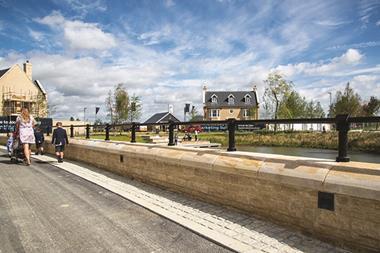Communities secretary James Brokenshire has called on local authorities and developers to apply for additional government funding for the development of new garden towns.

A new prospectus and bidding process have been launched, under which successful applicants will receive a “tailored package of government support that includes resource funding, expert delivery advice from Homes England and cross-government brokerage to resolve barriers to delivery.” The amount of funding awarded to each project will be dependent on the specific proposals.
The project is focused on garden towns of more than 10,000 homes, but will also consider garden villages comprising 1,500 to 10,000 homes. Applications from private sector developers will need to be “expressly supported” by the local authority.
The government says that its wider garden communities programme has already supported 23 garden communities, which have the potential to provide over 200,000 new homes by 2050.
Commenting on the launch, Brokenshire said: “This plan is about the government working with councils and developers to get great homes in keeping with beautiful areas in England. We want to help local authorities build strong and vibrant communities where people want to live, work, and raise families.
“Our garden communities programme already has the potential to provide over 200,000 new homes by 2050, and we want to go further.”
Property reacts
- Jason Lowes, partner in the planning team at Rapleys: “The doubling-down of focus on Garden Towns was the natural next step following the publication of the new NPPF. Garden Communities, which might include new towns or villages, are key to delivering the quantum of housing that the country needs and should be welcomed in principle. However, they are by their nature a long term solution and only part of the picture. Nearer term solutions, such as the expansion of existing cities, towns and villages are also critically important to ensure that people who want to can find new homes close to their families. This needs to be pursued through intensifying densities in appropriate locations (not least town centres) and reviewing the spaces around existing settlement boundaries – including, if necessary and appropriate, Green Belt land.”
- Victoria Hills chief executive of the Royal Town Planning Institute: “The government’s garden towns programme is critical to solving the housing crisis and creating quality and healthy living places that so many of us desire and need.It is vital that planning teams are properly resourced to deliver at a more strategic level. We have seen too many large developments in the wrong place with no proper strategic planning and consideration for quality design, jobs, infrastructure and amenities. Central and local government must put proactive planning at the centre if they are serious about making a success of developing new garden villages and housing at scale.”
- Kate Henderson, chief executive of the TCPA: “The prospectus presents an exciting opportunity for councils to think strategically about the most sustainable long-term growth options for their local areas and to come forward with proposals for high-quality new garden communities. We particularly welcome the inclusion of garden city principles in the prospectus, and we urge local authorities pursuing this approach to adopt the principles as a framework, enabling the creation of genuinely affordable, inclusive, high-quality and climate-resilient new communities with the highest environmental standards. We hope the government will properly invest in this programme over the long-term to enable the creation of places which truly meet the ambitions of the garden city movement. The autumn budget is an opportunity for the government to be bold and brave in its commitment to unlocking the delivery of new garden communities and must ensure that the locations which are supported are truly exemplar.”






























No comments yet